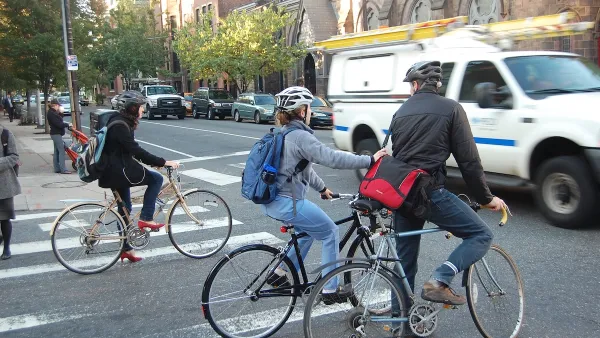The following post will likely result in the revocation of my Philadelphia residency. It’s heretical to say, especially on a day when the city is on fire (not literally; okay, mostly not literally) with excitement. But the city planner in me almost wishes the Phillies hadn’t won last night. Of course I wanted them to win the World Series. Twenty-five years is a long time for any city—let alone a four-sport city—to wait for a championship, and it’s definitely Philadelphia’s time. I’m thrilled to pieces they pulled it out.
The following post will likely result in the revocation of
my Philadelphia residency.
It's heretical to say, especially on a day when the city is
on fire (not literally; okay, mostly not literally) with excitement. But the
city planner in me almost wishes the Phillies hadn't won last night.
Of course I wanted them to win the World Series.
Twenty-five years is a long time for any city-let alone a four-sport city-to wait
for a championship, and it's definitely Philadelphia's time. I'm thrilled to
pieces they pulled it out.
But looking purely at the economic benefits of being in the
World Series: Winning sports teams are a windfall for cities. (How would teams
get cities to buy them new stadiums if they weren't?) With all the tourists and
fans coming to town, a World Series run is estimated to generate up to $20
million for a regional economy-and that doesn't even count all the people going
out to bars and restaurants to watch the game, and buying merchandise, as a
boon to local retailers.
So would it have killed them to drag the thing out to seven
games?
Like I said, 25 years is a long time to wait. We probably
could have held out another couple days.
The rain helped. Game Five had to be stretched out over two
days, which the Philadelphia Convention & Visitors' Bureau estimated would
add another $1 to $3 million to the local economy. Bob and Barbara's, the
dive-y local watering hole where I chose to watch Philadelphia claim its
birthright, was jumping for two nights' worth of Game Five, whereas a week earlier,
the bartender said , the place was empty.
Even the visiting Tampa Bay Rays couldn't find an extra
night's hotel rooms in town. Thanks to a concurrent World Series and American
College of Chest Physicians convention, every hotel room in the city was sold
out. (Woo-hoo, chest physicians!) The Rays had to sleep in Delaware. (Suckers.)
So imagine if there were two more nights of pumping cash
into our budget-constrained local economy.
Still, the electricity after last night's win was
exhilarating. We went straight to Broad Street, where an estimated 100,000 fans
swarmed to cheer, shout, hug, streak, bang pots and pans, climb onto bus
shelters, wave American flags, wave Obama signs (Philly loves it some Obama), and
yes, flip a car or two and break a couple windows.
There are plenty of pictures of the festivities all around
the Internet. But as good as those are, they can't capture the camaraderie and
civic spirit of complete strangers high-fiving each other, of an impromptu
block party stretching for miles along the city's main artery, of police and
cabbies alike joyously honking their horns incessantly as they drive up and
down the streets.
Try though we might, that's the kind of city you can't plan any better.

Planetizen Federal Action Tracker
A weekly monitor of how Trump’s orders and actions are impacting planners and planning in America.

Maui's Vacation Rental Debate Turns Ugly
Verbal attacks, misinformation campaigns and fistfights plague a high-stakes debate to convert thousands of vacation rentals into long-term housing.

San Francisco Suspends Traffic Calming Amidst Record Deaths
Citing “a challenging fiscal landscape,” the city will cease the program on the heels of 42 traffic deaths, including 24 pedestrians.

Defunct Pittsburgh Power Plant to Become Residential Tower
A decommissioned steam heat plant will be redeveloped into almost 100 affordable housing units.

Trump Prompts Restructuring of Transportation Research Board in “Unprecedented Overreach”
The TRB has eliminated more than half of its committees including those focused on climate, equity, and cities.

Amtrak Rolls Out New Orleans to Alabama “Mardi Gras” Train
The new service will operate morning and evening departures between Mobile and New Orleans.
Urban Design for Planners 1: Software Tools
This six-course series explores essential urban design concepts using open source software and equips planners with the tools they need to participate fully in the urban design process.
Planning for Universal Design
Learn the tools for implementing Universal Design in planning regulations.
Heyer Gruel & Associates PA
JM Goldson LLC
Custer County Colorado
City of Camden Redevelopment Agency
City of Astoria
Transportation Research & Education Center (TREC) at Portland State University
Jefferson Parish Government
Camden Redevelopment Agency
City of Claremont





























